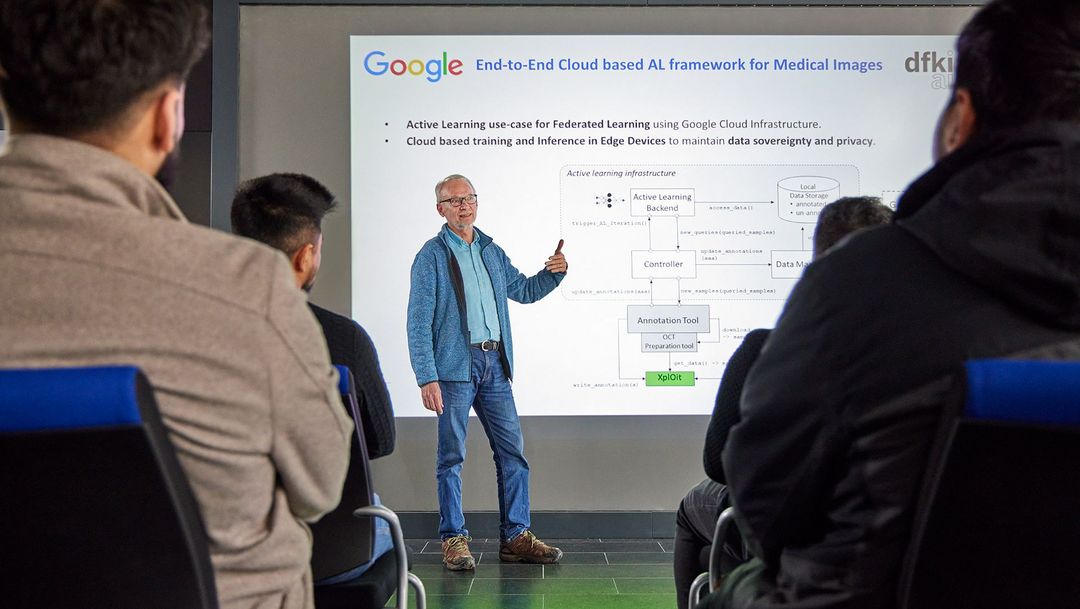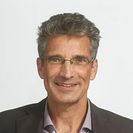
AI for the Cloud – DFKI and Google expand their partnership
| Transfer Stories | Health & Medicine | Knowledge & Business Intelligence | Data Management & Analysis | Image Recognition & Understanding | IT Security | Machine Learning & Deep Learning | Language & Text Understanding | Interactive Machine Learning | Smart Data & Knowledge Services | Speech and Language Technology | Kaiserslautern | Saarbrücken | Press release


Together with Google, our researchers are developing AI technologies to help in the endeavour of making the incredible amount of information on the web accessible to the general public. Current projects range from new processing methods for complex search queries to the expansion of GPU clusters in the cloud. The long-standing collaboration with Google is another perfect example of how the successful transfer of AI research results into applications is able to create added value on the market and also establishes proven partnerships.

We have enjoyed a close partnership with DFKI, one of the most internationally renowned research institutions, for many years. We are very pleased to be able to deepen this with further research projects. The four projects will combine DFKI's expertise with Google Cloud technology to advance research.
DFKI is free to use the funding as it sees fit and will independently drive forward the research in the four funded projects. The results ought to be published in the form of scientific papers. Experts from Google Cloud will help to carry out extensive computing work in machine learning (ML) and the storage of large amounts of data in the cloud. This will enable DFKI to expand its expertise in the field of cloud computing.
More about the four research projects
Private Data Adapters for ML. DFKI: Sebastian Palacio
‘In this project, we want to tackle the problem of cold starts in machine learning applications for private data sets,’ says Sebastian Palacio, project manager and researcher in the Smart Data & Knowledge Services department at DFKI in Kaiserslautern. This problem occurs when there is not enough labelled data available to train ML models, which hinders the development of effective solutions. Traditionally, this problem has been solved by manually fitting models from the public domain to a private dataset. However, such a trial-and-error approach is time-consuming and often ineffective
Sovereign Cloud: Secure integration of business expert knowledge into large language models. DFKI: Sven Schmeier, Roland Roller
Large language models are to be integrated into DFKI's websites using the latest artificial intelligence methods. This will not only make it possible to ask simple questions (‘Who is CEO?’), but also to enquire about things that would otherwise be barely recognisable or very difficult to combine. ‘The aim of the project is to investigate the extent to which it is possible to make websites accessible in such a way that it is possible to ask complex questions about these websites,’ says Sven Schmeier from the Speech and Language Technology department at DFKI.
End-to-End Active Learning Framework for Medical Image Annotation. DFKI: Daniel Sonntag, Abdul Kadir und Hasan Alam
A major challenge in the use of artificial intelligence is the sufficient availability of labelled data. The annotation of data is an essential, but also time-consuming and costly process. A particularly effective approach is so-called ‘active learning’ by machines. Active learning improves machine learning models by strategically selecting the most informative data points for labelling, resulting in faster and more efficient learning as less manually labelled data is required. Daniel Sonntag and his team of researchers at DFKI in Lower Saxony have developed an AI-system called ‘MedDeepCycAL’ that provides active learning in medical imaging. It provides researchers with machine support in the classification and segmentation of medical images, as well as a free choice of the type of AI-processing.
Scaling on-premise GPU cluster to the cloud. DFKI: Christian Schulze
The training and fine-tuning of language models and other deep learning models requires large-scale calculations, which are mainly performed on specialised computing units known as Graphics Processing Units (GPUs). DFKI has corresponding computer clusters in its own data centres, but it can happen that demand exceeds supply, e.g. before scientific conferences. ‘The project is intended to enable the expansion of existing GPU resources into the cloud if there is a corresponding demand that cannot be met with the existing resources,’ explains Christian Schulze, project manager and researcher at DFKI in Kaiserslautern. This is a proof of concept (POC) that is intended to lay the foundations for cloud deployments on demand. The focus here is particularly on infrastructure as code.
Previous collaboration between Google and DFKI
Google has been a shareholder of the German Research Centre for Artificial Intelligence (DFKI) since 2015. DFKI was the first research company in Europe in which Google participated by making a capital contribution and taking a seat on the supervisory board. The collaboration between Google and DFKI is multifaceted. The IT company regularly awards research and development contracts to DFKI. DFKI researchers have already received an international research award from Google on several occasions. The links have also been close for many years through personnel transfers. Dr Wieland Holfelder represents Google on the DFKI Supervisory Board.

About Google
Google has devoted itself to the task of organising the world's information and making it generally accessible and usable. This includes developing artificial intelligence ambitiously, responsibly and in dialogue with others so that everyone can benefit from it. With products such as Google Search, Maps, Gmail, Chrome, Gemini, Pixel smartphones and watches or platforms such as YouTube, Google plays an important role in the daily lives of billions of people. Google has been represented in Germany since 2001 and now employs more than 2,500 people at its four locations in Hamburg, Berlin, Munich and Frankfurt. Together with local partners, Google Germany is working on numerous digitalisation projects, for example in the areas of education, trade, infrastructure, climate and data protection. At the Google Safety Engineering Centre (GSEC) in Munich, Google develops data protection applications for the whole world. And with communication solutions, a cloud data centre near Frankfurt and two cloud regions with a focus on increased efficiency and sustainability, Google supports companies in Germany in their digital transformation. Google is a subsidiary of Alphabet Inc.
Contact:
Dr. Ralf Bremer
Speaker, Google Deutschland
- rbremer@google.com
- Phone: +49 0172 434 50 47
Dr. Sven Schmeier
Researcher Department SLT, DFKI
- Sven.Schmeier@dfki.de
- Phone: +49 30 23895 1815
Press contact:
Jeremy Gob
Public Relations C&M KL, DFKI
- Jeremy.Gob@dfki.de
- Phone: +49 631 20575 1730
Christian Heyer
Leiter C&M KL, DFKI
- Christian.Heyer@dfki.de
- Phone: +49 631 20575 1710